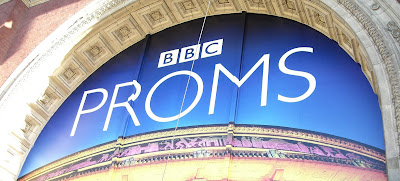BBC Proms - new music in safe doses

Here are Pliable's personal picks for the remainder of this year's BBC Proms season. All Proms are available for seven days online, detailed programmes and broadcast times for every concert are available from the BBC web site.
* August 29, 10.00pm - important contemporary music is once again consigned to the bed-time ghetto. Works by Oliver Knussen, Anton Webern and Julian Anderson are performed by the Birmingham Contemporary Music Group.
* August 30, 7.30pm - a rare opportunity to hear Artur Honegger's excellent 1946 Symphony No. 3 Symphonie liturgie played by the Bavarian Radio Symphony under Mariss Jansons . Herbert von Karajan's recorded legacy has dated somewhat, but his recording of this symphony is definitive. (Lovely Lauterwasser cover photo as well).
* August 31, 7.30pm - shout it from the rooftops - the world premiere of Thea Musgrave's Two's Company, a BBC commission. I wrote about Thea Musgrave's concerto for orchestra, Helios, a few weeks ago when I played the NMC recording of it on my Overgrown Path radio programme. The soloists for this premiere are oboist Nicholas Daniel, who also plays on the NMC recording of Helios, and Evelyn Glennie. For this Prom we have a rare sighting of chief conductor Jiří Bělohlávek on the podium with the BBC Symphony Orchestra, obviously finding out where the Albert Hall is before presiding over the Last Night on Saturday. Great to see a big dose of new music, but the BBC really does have a blockage about women composers at the Proms. At the time of writing Thea Musgrave's name is completely missing from the BBC's online listing of composers with performances at the 2007 Proms.
* September 4, 7.30pm - the Vienna Philharmonic and Daniel Barenboim serve up Ligeti in a digestible portion (Atmosphères - 9 mins), and a rather bigger serving of Bartók (Music for Strings, Percussion and Celesta - 30 mins). No minimalist composers, but a distinctly minimalist programme - 30 minutes of music in the first half and 38 minutes in the second with top price tickets at £45. Did I hear anyone mention attracting new audiences?
* September 7, 7.30pm - is it a coincidence that this concert by the Boston Symphony and James Levine also contains exactly nine minutes of contemporary music in the form of Elliott Carter's Three Illusions for Orchestra? Or is nine minutes the maximum permissible duration for contemporary music before it is shunted off to the late-night graveyard slot? Safer Brahms and Bartók provide the other 86 minutes.
* September 8, 7.30pm - tokenism reaches its logical conclusion with just one contemporary work in this concert - a three minute excerpt from Thomas Adès' The Storm. Not enough to mar the whitewashing of the history of music.
Now read more about music history rewritten.
Any copyrighted material on these pages is included as "fair use", for the purpose of study, review or critical analysis only, and will be removed at the request of copyright owner(s). Report broken links, missing images and other errors to - overgrownpath at hotmail dot co dot uk









Comments
And I love that phrase balkanization of new music - it will make a lovely headline someday.
Happy Third Anniversary, Bob!